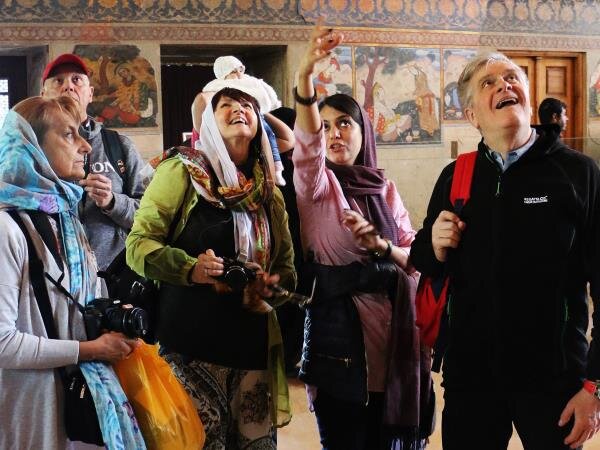Tourist arrivals in Iran jump 40 percent y/y

TEHRAN – Foreign arrivals to Iran during the first seven months of the current Iranian year were up 40% compared to the same period last year, the deputy tourism minister said.
“In the first seven months of this year, the arrival of overseas tourists to the country increased by 40% compared to the same period last year,” Ali-Asghar Shalbafian said.
He says the rate of tourist arrivals, mainly from Iran’s neighboring countries, has been “promising”.
The official said Iran enjoys a considerable share of arrivals from its neighboring countries.
“The tourism ministry has put in a great deal of effort to both ease arrivals and diversify its tourism sources,” he added. “For example, travelers from Iraq and Turkey can easily visit Iran in their own cars and such a facilitation is to be provided for travelers from Armenia in the near future.”
According to available data, the Islamic Republic saw 3.35 million foreign arrivals in the first half of the current Iranian year, which soared 38 percent year on year.
Pursuing a border-easing scheme, the Iranian government mulls abolishing visa requirements for passport holders from 68 countries. The country seeks to encourage overseas travelers, though available evidence suggests it will not be finalized to be implemented shortly.
Shalbafian says the visa waiver incentive will mostly be granted to neighboring countries as well as those considered emerging markets with a considerable population and per capita income.
The tentative list includes Argentina, South Africa, Indonesia, Jordan, Uruguay, Uzbekistan, Estonia, Slovakia, Slovenia, Ecuador, Algeria, UAE, Bahrain, Bolivia, Bosnia and Herzegovina, Brazil, Belarus, Bulgaria, Burkina Faso, Paraguay, Peru, Tanzania, Tajikistan, Thailand, and Turkmenistan.
Tunisia, Czech Republic, Russia, Romania, Japan, Ivory Coast, Singapore, Senegal, Sudan, Seychelles, Chile, Serbia, Saudi Arabia, Ghana, Finland, Cyprus, Kyrgyzstan, Kazakhstan, Qatar, Cameroon, Croatia, South Korea, Colombia, Comoros, Kuwait, Guinea, Poland, Luxembourg, Libya, Lithuania, Malaysia, Maldives, Hungary, Macedonia, Mexico, Mauritius, Mali, Madagascar, Niger, Vietnam, Yemen, Greece, and India constitute other states whose nationals may be granted visa-free access.
The number of tourist arrivals is estimated to reach six million by the end of the current year (March 19, 2024), Shalbafian said last month. “With the [steady] increase in the arrival of foreign tourists, it is expected the number of international arrivals will reach about 6 million by year-end.”
According to available data, Iran's tourism had constantly been growing before the COVID-19 pandemic, reaching more than eight million visitors in the Iranian calendar year 1398 (started March 21, 2019).
Based on the latest United Nations World Tourism Organization (UNWTO) World Tourism Barometer, foreign tourist arrivals in Iran reached some 2.93 million between January and July 2023.
The average statistics of Iran’s tourism from January to August 2023 is 50% lower than the same period in 2019 based on the barometer that tracks the sector’s post-pandemic recovery throughout 2023 up to the end of July.
The Islamic Republic expects to reap a bonanza from its numerous tourist spots such as bazaars, museums, mosques, bridges, bathhouses, madrasas, mausoleums, churches, towers, and mansions, of which 27 are inscribed on the UNESCO World Heritage list.
AFM
